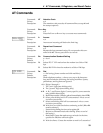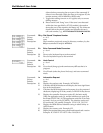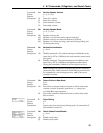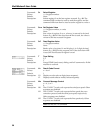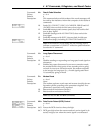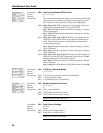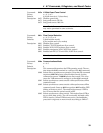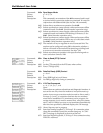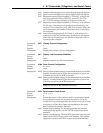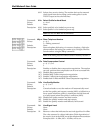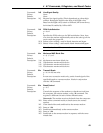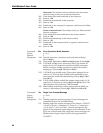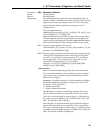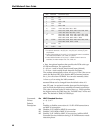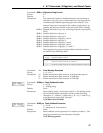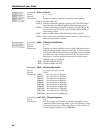
4 AT Commands, S-Registers, and Result Codes
41
&T4 Enables acknowledgment for remote digital loopback request.
&T5 Ignores acknowledgment for remote digital loopback request.
&T6 Requests a remote digital loopback, V.54 Loop 2, without self-
test. If no connection exists, ERROR is returned. The CON-
NECT XXXX message is displayed at the start of the test.
&T7 Requests a remote digital loopback, V.54 Loop 2, with self-test.
(In self-test, a test pattern is looped back and checked by the
modem.) If no connection exists, ERROR is returned. When the
test is terminated, the number of detected errors is reported to
the computer.
&T8 Starts local analog loopback, V.54 Loop 3, with self-test. If a
connection exists, the modem hangs up before the test begins.
When the test is terminated, the number of detected errors is
reported to the computer.
Command: &V0 Display Current Configuration
Values: 0
Default: None
Description: Displays the current (active) configuration.
Command: &V1 Display Last Connection Statistics
Values: 1
Default: None
Description: Displays statistics for the last connection.
Command: &W
n
Store Current Configuration
Values: n = 0 or 1
Default: None
Description: &W0 Stores current modem settings in nonvolatile memory as Profile 0.
Profile 0 is loaded instead of the factory defaults at power-on
(if &Y0 is set) and by the ATZ command.
&W1 Stores current modem settings in nonvolatile memory as Profile 1.
Profile 1 is loaded instead of the factory defaults at power-on
(if &Y1 is set) and by the ATZ1 command.
Note: See also the Z, &F, and &Y commands.
Command: &X
n
Synchronous Clock Source
Values: n = 0, 1, or 2
Default: 0
Description: Selects the source of the transmit clock for synchronous mode.
In asynchronous mode, the transmit and receive clocks are
turned off. In synchronous mode, the clocks are turned on with
a frequency of 1200 Hz or faster corresponding to the speed
that is selected for modem operation.
&X0 Selects internal timing. The modem generates the transmit
clock signal and applies it to the TXCLK output at the serial
interface.
&X1 Selects external timing. The local DTE sources the transmit clock
signal on the XTCLK input of the serial interface. The modem
applies this clock to the TXCLK output at the serial interface



